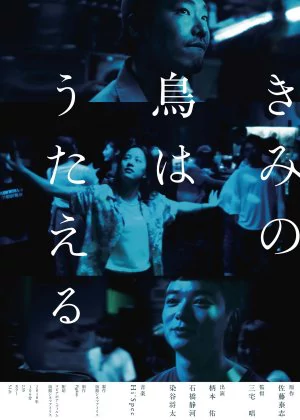And Your Bird Can Sing

I've seen so many Japanese dramas in my life that few still manage to surprise me. Sho Miyake's And Your Bird Can Sing [Kimi no Tori wa Utaeru] is not one of them, but that doesn't mean it's a film that can be easily discarded. As with most traditional genre fare, the devil is in the details, and the film offers a particular lightness that is rarely seen in a fully edged drama. Of course, availability is going to be the biggest challenge for people chasing films like this, but if the opportunity presents itself, do yourself a favor and give this one a go.
![screen capture of And Your Bird Can Sing [Kimi no Tori wa Utaeru]](/thumbs/img/articles/1200xauto/bird-can-sing-1.webp)
Japanese drama can be a pretty rigid format to work in. There are some niches, and you have a handful of directors who have managed to carry a personal signature throughout their films, but for the most part it is a succession of stylistic and narrative clichés that do get a bit stale once you've seen enough of them. And Your Bird Can Sing adheres to the broader expectations I had of the film, but it finds enough smaller variables to twist, in order to give a genre fan like me at least the impression it offers something I hadn't seen a million times before.
The love triangle/ménages à trois is a pretty popular theme for (romantic) dramas, but it's not that easy to pull off. You need three strong characters, and there has to be enough chemistry between all three of them to draw out the necessary intrigue. Miyake makes it extra tricky on himself by forgoing the usual relationship drama that follows out of this setup, instead, opting to let everyone get along with each other. It's risky for sure, but ultimately that's what really sets this film apart from its peers and what gave it that little extra edge I was looking for.
Boku and Shizuo share a flat together. They've been roommates for a while, and they respect each other's privacy, but they've also grown to be good friends. Boku is a guy who takes life lightly and has trouble keeping his job in a local bookstore, Shizuo is a bit more serious, but he's currently unemployed. Their dynamic doesn't change much when Sachiko starts dating Boku. They become a perfect trio, though the romance only lives between Boku and Sachiko. As they spend more time together, Shizuo also begins to develop feelings for Sachiko, but he doesn't want to get in between Sachiko and his best friend. On paper, he is the most logical fit for Sachiko though.
![screen capture of And Your Bird Can Sing [Kimi no Tori wa Utaeru]](/thumbs/img/articles/1200xauto/bird-can-sing-2.webp)
The visuals aren't too exceptional, but they are slick and perfectly executed. The camera gets close to the characters and there's a slight handheld aesthetic to add a bit of grit to the drama, but without sacrificing color and lighting polish in the process. The colors look very crisp and clean, while the lighting is atmospheric, which you don't see too often once the camera work gets a bit wobblier. It's a very pleasant combination that supports the characters and drama, while also making sure the film works as an emotional mood piece. Though I prefer the cinematography to be a bit more outspoken, I really can't fault the film for its visuals.
The music is also pretty standard for a Japanese drama. Light and comforting tunes that create a pleasant, somewhat meandering atmosphere. There are one or two nightclub scenes though, and that's where Miyake finds an opening to do something a bit more unique with the music. The loungy hip-hop inspired tracks feel genuine and immediately ground the characters. It's a smart and effective way to add some extra spice to the soundtrack without deviating too much from the norm, and it's always a plus to see more realistic club scenes in films, so very good work there.
As for the performances, all three leads are absolutely stellar. Shota Sometani is one of the most talented young actors of the moment, Tasuku Emoto is perfect for his part and Shizuka Ishibashi presents herself as the successor of Shinobu Terajima (which is high praise coming from me). Not only do the three deliver intriguing characters, the chemistry between them is on point, as they actually manage to come off as a group of real life friends. The secondary cast is decent, but none of the actors there take away the spotlight from the main trio (as it should be).
![screen capture of And Your Bird Can Sing [Kimi no Tori wa Utaeru]](/thumbs/img/articles/1200xauto/bird-can-sing-3.webp)
Boku is the central figure of the film, as his unique outlook on life draws the other two towards him. I'm not sure if many would consider him a nice guy, but he certainly is intriguing and while his behavior can appear a little random, there's a clear drive that pushes him forward. The ending makes that perfectly clear. A scene that approximates Takeshi Kitano's Dolls' scene of remembrance and which left me crushed. It's been a while since a drama accomplished that, but I'm equally certain not everyone is going to appreciate the open ending.
If you don't care for Japanese dramas than And Your Bird Can Sing isn't going to change your mind. It's by and large a film that fits very well with the others in the genre. Minor details, like some very smart soundtrack choices, noticeably elevated cinematography, superb performances and more tempered dramatic influences make the real difference here. It's my first Miyake, I will say it made me very curious about exploring the rest of his oeuvre. Sadly, like many of his contemporaries, the real adventure will probably be getting my hands on his films.